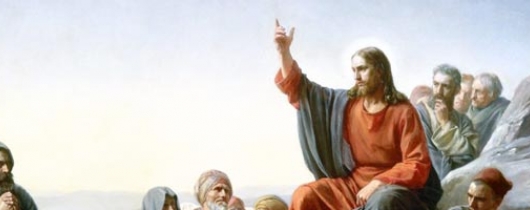The Most Exceptional Sermon | El Sermón más Excepcional

Wednesday of the 3rd Week of Lent
Deuteronomy 41:1, 5-9; Matthew 5:17-19
Nobody likes long sermons…unless they’re exceptionally powerful. Over many centuries, the Book of Deuteronomy and the Sermon on the Mount have proved to be among those exceptions.
The author of the Book of Deuteronomy, part of the Torah or Pentateuch (the first five books of the Bible) styled it as an extended sermon that Moses delivered to the people of Israel. They had completed their 40-year sojourn in the desert after their deliverance from slavery in Egypt. It had been a difficult journey. They were about to enter the land that God had promised to give them. Moses would not make the crossing with them. Sensing his impending death and desiring to ensure their fidelity to their covenant with God, he wanted to leave them with a final message.
It was a stern and clear message. If the people of Israel were faithful to the covenant they had made with God at Sinai, they would be blessed with life, land, and prosperity. But if they were unfaithful, they would lose it all. The rest of the Old Testament reveals how that warning was fulfilled. The people God had chosen as his own vacillated between periods of fidelity and infidelity. They would see both times of peace and prosperity and generations of subjugation and exile.
Jesus was born and began his ministry in one of the times of subjugation. Like Moses, he called his people to be faithful to the laws God had given them. The Sermon on the Mount, however, called them to an even deeper commitment. Yes, they were to observe the law as written. But more importantly, they were called to conform their thoughts, words, and actions so thoroughly to God’s will that they would reveal the reign of God to the whole world. It would last longer and bless the world far greater than any earthly ruler could promise or achieve.
Take some time to read the Sermon on the Mount (Matthew 5-7). Prepare to be inspired…and challenged. jc
Image: Sermon on the Mount (1877) by Carl Bloch (1834-1890). Oil on copper. Frederiksborg Hillerod museum, Hillerod, Denmark. Public Domain.
Accessed March 6, 2024 from https://commons.wikimedia.org/wiki/File:Bloch-SermonOnTheMount.jpg
------------------------------------------------------------------------------------------------------------------
6 de marzo de 2024
Miércoles de la 3ª semana de Cuaresma
Deuteronomio 41:1, 5-9; Mateo 5:17-19
A nadie le gustan los sermones largos... a menos que sean excepcionalmente impactantes. A lo largo de muchos siglos, el Libro del Deuteronomio y el Sermón de la Montaña han demostrado estar entre esas excepciones.
El autor del Libro del Deuteronomio, que forma parte de la Torá o Pentateuco (los cinco primeros libros de la Biblia), lo definió como un extenso sermón que Moisés dirigió al pueblo de Israel. Habían terminado su estancia de 40 años en el desierto tras liberarse de la esclavitud en Egipto. Había sido un viaje difícil. Estaban a punto de entrar en la tierra que Dios había prometido darles. Moisés no les acompañaría en la travesía. Presintiendo su muerte inminente y deseando asegurar su fidelidad a su pacto con Dios, quiso dejarles un último mensaje.
Era un mensaje severo y claro. Si el pueblo de Israel era fiel a la alianza que había hecho con Dios en el Sinaí, sería bendecido con vida, tierra y prosperidad. Pero si eran infieles, lo perderían todo. El resto del Antiguo Testamento revela cómo se cumplió esa advertencia. El pueblo que Dios había elegido como suyo vaciló entre períodos de fidelidad e infidelidad. Verían tanto tiempos de paz y prosperidad como generaciones de subyugación y exilio.
Jesús nació y comenzó su ministerio en una de las épocas de sometimiento. Como Moisés, llamó a su pueblo a ser fiel a las leyes que Dios les había dado. El Sermón de la Montaña, sin embargo, los llamaba a un compromiso aún más profundo. Sí, debían observar la ley tal como estaba escrita. Pero, lo que es más importante, estaban llamados a conformar sus pensamientos, palabras y acciones tan completamente a la voluntad de Dios que revelarían el reino de Dios a todo el mundo. Duraría más y bendeciría al mundo mucho más de lo que cualquier gobernante terrenal podría prometer o lograr.
Tómate un tiempo para leer el Sermón de la Montaña (Mateo 5-7). Prepárate para ser inspirado... y desafiado. jc
Imagen: Sermón de la Montaña (1877) de Carl Bloch (1834-1890). Óleo sobre cobre. Museo Frederiksborg Hillerod, Hillerod, Dinamarca. Dominio público.
Consultado el 6 de marzo de 2024 en https://commons.wikimedia.org/wiki/File:Bloch-SermonOnTheMount.jpg
Asistencia de traducción por DeepL.com®




